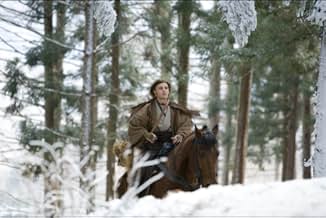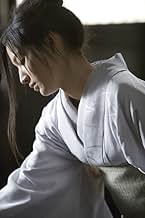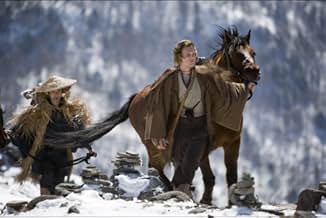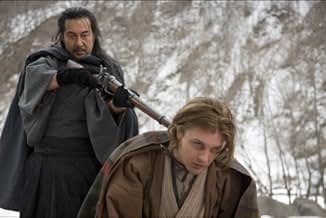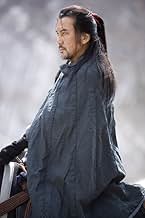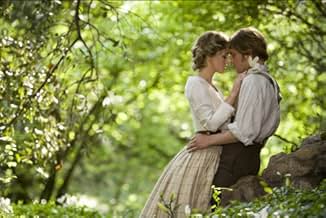AVALIAÇÃO DA IMDb
5,8/10
12 mil
SUA AVALIAÇÃO
Na França do século XIX, um comerciante de bichos-da-seda casado que virou contrabandista busca suprimentos de bichos-da-seda no Japão depois que o suprimento africano se esgotou e fica obce... Ler tudoNa França do século XIX, um comerciante de bichos-da-seda casado que virou contrabandista busca suprimentos de bichos-da-seda no Japão depois que o suprimento africano se esgotou e fica obcecado pela concubina de um barão local.Na França do século XIX, um comerciante de bichos-da-seda casado que virou contrabandista busca suprimentos de bichos-da-seda no Japão depois que o suprimento africano se esgotou e fica obcecado pela concubina de um barão local.
- Direção
- Roteiristas
- Artistas
- Prêmios
- 7 vitórias e 5 indicações no total
Alexander Brooks
- M. Loiseau
- (as Leslie Csuth)
- Direção
- Roteiristas
- Elenco e equipe completos
- Produção, bilheteria e muito mais no IMDbPro
Avaliações em destaque
If Fate would have it, I would have the opportunity to go to Tokyo for this year's Japanese International Film Festival, and watched this as the closing film. Initially I had mixed this up with Atonement, also starring Keira Knightley in a period romance story, except that this one had shades of The Last Samurai thrown in, with the love triangle moments with the involvement of a Japanese girl.
Based on the novel by Alessandro Baricco, Silk takes its name from the Silk trade, where a French village looks to having its economy hit, if not for Alfred Monlina's Baldabiou who ventures into opening a silk mill and employing the townsfolk. However, in need of untainted silkworm eggs, free from an epidemic striking Europe, he sends overseas one of his staff Herve Joncour (Michael Pitt), whom is indebted to him for arranging his marriage with Knightley's Helene, and off he goes on the arduous journey first to Africa, then to the land of the rising sun, now in the impending stage of internal strife.
The journeys are probably the best bits in the movie, with lush landscapes filling the screen in all serenity of the turmoils that are yet to come. I thought director Francois Girard tried to ape Terence Mallick's direction, with lush natural beauty punctuated with voice over narration of the character's inner-most thoughts. We learn a lot of what's going on in Herve's mind, as he tells us the story of his being, and the conflict he faces when he gets tempted to committing adultery, never forgetting about his tryst overseas when back home he has a lovely wife to go home to.
While the movie has that central conflict that provides the fuel to propel the movie forward, somehow it never gets utilized, having the story and characters dance around on the sidelines of the issue, never to take it head on. This adds to the frustration of watching the deliberations that they have, made worse as the movie chooses to unfold itself extremely slowly, taking too much of its own sweet time. Fans of Keira Knightley would have watched this movie solely to see her performance after the Pirates double bill, but sadly, even though she's given top billing, her screen time is limited, as the spotlight falls on Michael Pitt's Herve and we are told of this story through his eyes.
What adds to the annoyance as well, is that the movie is sans English subtitles. Having it set in France but the characters speaking in English is understandable (after all, Pitt is American and Knightley is English), but having the Japanese speak in their native tongue, and not providing the subtitles, removes a layer that would have provided probably a deeper understanding of the movie. Yes, granted we are supposed to feel the pain of Herve in his inability to connect with the people and the one he loves, but I don't feel that this should be done at the expense of understanding, especially for non-Japanese speaking folks.
However, despite its obvious flaws, the movie redeems itself with a powerful end, packing quite a punch especially when you think it's headed nowhere and probably into mediocrity. Suddenly you discover that things are again not always what they seem, and wonder just who the bigger fool is. But the bottomline, if there's a message to be taken away from this movie, is again never to give in to temptation, and truly treasure your loved ones. Tried and tested, clichéd but true.
Based on the novel by Alessandro Baricco, Silk takes its name from the Silk trade, where a French village looks to having its economy hit, if not for Alfred Monlina's Baldabiou who ventures into opening a silk mill and employing the townsfolk. However, in need of untainted silkworm eggs, free from an epidemic striking Europe, he sends overseas one of his staff Herve Joncour (Michael Pitt), whom is indebted to him for arranging his marriage with Knightley's Helene, and off he goes on the arduous journey first to Africa, then to the land of the rising sun, now in the impending stage of internal strife.
The journeys are probably the best bits in the movie, with lush landscapes filling the screen in all serenity of the turmoils that are yet to come. I thought director Francois Girard tried to ape Terence Mallick's direction, with lush natural beauty punctuated with voice over narration of the character's inner-most thoughts. We learn a lot of what's going on in Herve's mind, as he tells us the story of his being, and the conflict he faces when he gets tempted to committing adultery, never forgetting about his tryst overseas when back home he has a lovely wife to go home to.
While the movie has that central conflict that provides the fuel to propel the movie forward, somehow it never gets utilized, having the story and characters dance around on the sidelines of the issue, never to take it head on. This adds to the frustration of watching the deliberations that they have, made worse as the movie chooses to unfold itself extremely slowly, taking too much of its own sweet time. Fans of Keira Knightley would have watched this movie solely to see her performance after the Pirates double bill, but sadly, even though she's given top billing, her screen time is limited, as the spotlight falls on Michael Pitt's Herve and we are told of this story through his eyes.
What adds to the annoyance as well, is that the movie is sans English subtitles. Having it set in France but the characters speaking in English is understandable (after all, Pitt is American and Knightley is English), but having the Japanese speak in their native tongue, and not providing the subtitles, removes a layer that would have provided probably a deeper understanding of the movie. Yes, granted we are supposed to feel the pain of Herve in his inability to connect with the people and the one he loves, but I don't feel that this should be done at the expense of understanding, especially for non-Japanese speaking folks.
However, despite its obvious flaws, the movie redeems itself with a powerful end, packing quite a punch especially when you think it's headed nowhere and probably into mediocrity. Suddenly you discover that things are again not always what they seem, and wonder just who the bigger fool is. But the bottomline, if there's a message to be taken away from this movie, is again never to give in to temptation, and truly treasure your loved ones. Tried and tested, clichéd but true.
This film was actually good, and I expected the worst :)...
It's interesting to watch with somebody of the opposite sex that you don't know well. You could tell a few things about her afterwards, like: Does she like classical music? Does she feel anything when watching splendid landscapes? Is she intelligent enough to figure the story's twist near the end? (I wasn't even close) Does she like "slow" movies? Can she withstand a moderate dose of "drama"? Can she feel Helene's plight?
The only character I really liked was Afred Molina's "Baldabiou". He's an entrepreneur with flavour for life. Likable, tough but sensitive. A "father figure" to "Herve", who sorely needs one with such a bore of a father! Herve's attitude to life was a bit strange to me. My friend said something that's always been there: "he never smiles". True, he barely winces, never seems to be happy, just like drowsily fulfilling a desk job. Schuyler was great in his small role. How a street smart adversary can become a restrained source of practical wisdom! Madame Blanche is also a necessary small role, but that has the life experience Herve will always lack. He surely got sympathy from smart strangers! I didn't get involved in Ludovic Berbek's story, although it's there with the clear intention of moving us. I also thought all this story of "marital unhappiness", infertility and she crying as they made love was a bit contrived. I will never like Keira, but at least she doesn't look like a "tomboy beanpole" (!) as she said on one interview. Which wouldn't be becoming for her "modest wife" role. She's not as good as her Guinevere, but at least she does her rather plain role without showing off. She doesn't look anorexic like in other roles. Maybe she didn't endure wearing a corset like on "Pirates of the Caribbean".
The best review I read was "Grady Harp from United States". I think it deserves to be the one you read first.
My favourite scene is when the local baron shows cold Herve the peaceful place he and his ancestors enjoy for watching nature and connecting with nature. I also wanted to "have a garden" after watching this, thou I content myself with some plants in the balcony :)! And Japan shows itself like a harsh country, both geographically and with respect to the Japanese. An ancient land with rules hard to understand by any westerner. I did like the fact that the Japanese dialogues weren't subtitled. Unlike "Memoirs of a Geisha" & even "the last Samurai" I think that made us feel a bit like it must have been. The sort of "ostrananie" experience that the Russian formalist extolled as "Art".
It's interesting to watch with somebody of the opposite sex that you don't know well. You could tell a few things about her afterwards, like: Does she like classical music? Does she feel anything when watching splendid landscapes? Is she intelligent enough to figure the story's twist near the end? (I wasn't even close) Does she like "slow" movies? Can she withstand a moderate dose of "drama"? Can she feel Helene's plight?
The only character I really liked was Afred Molina's "Baldabiou". He's an entrepreneur with flavour for life. Likable, tough but sensitive. A "father figure" to "Herve", who sorely needs one with such a bore of a father! Herve's attitude to life was a bit strange to me. My friend said something that's always been there: "he never smiles". True, he barely winces, never seems to be happy, just like drowsily fulfilling a desk job. Schuyler was great in his small role. How a street smart adversary can become a restrained source of practical wisdom! Madame Blanche is also a necessary small role, but that has the life experience Herve will always lack. He surely got sympathy from smart strangers! I didn't get involved in Ludovic Berbek's story, although it's there with the clear intention of moving us. I also thought all this story of "marital unhappiness", infertility and she crying as they made love was a bit contrived. I will never like Keira, but at least she doesn't look like a "tomboy beanpole" (!) as she said on one interview. Which wouldn't be becoming for her "modest wife" role. She's not as good as her Guinevere, but at least she does her rather plain role without showing off. She doesn't look anorexic like in other roles. Maybe she didn't endure wearing a corset like on "Pirates of the Caribbean".
The best review I read was "Grady Harp from United States". I think it deserves to be the one you read first.
My favourite scene is when the local baron shows cold Herve the peaceful place he and his ancestors enjoy for watching nature and connecting with nature. I also wanted to "have a garden" after watching this, thou I content myself with some plants in the balcony :)! And Japan shows itself like a harsh country, both geographically and with respect to the Japanese. An ancient land with rules hard to understand by any westerner. I did like the fact that the Japanese dialogues weren't subtitled. Unlike "Memoirs of a Geisha" & even "the last Samurai" I think that made us feel a bit like it must have been. The sort of "ostrananie" experience that the Russian formalist extolled as "Art".
This is a beautiful film.
The story stays very close to the book I had already read twice (around 10 years ago then 6 months ago). The adaptation is faithful to the author, and even if there's not much words, the intensity of the feelings is always present. The actors convey these feelings very well, with deep sensitivity and great sensuality (just watch when Hervé is in the Japanese wooden tub, and the girl pours water on his face and lips with her fingers). The settings and sceneries are overwhelming: there's so much beauty-like the snow covered trees in Japan, the Joncour garden, ... François Girard had already shown how a fantastic Director he is with his 2 previous films, and now with Silk! He has such a strong aesthetic sense, and a great way to direct actors...
The story stays very close to the book I had already read twice (around 10 years ago then 6 months ago). The adaptation is faithful to the author, and even if there's not much words, the intensity of the feelings is always present. The actors convey these feelings very well, with deep sensitivity and great sensuality (just watch when Hervé is in the Japanese wooden tub, and the girl pours water on his face and lips with her fingers). The settings and sceneries are overwhelming: there's so much beauty-like the snow covered trees in Japan, the Joncour garden, ... François Girard had already shown how a fantastic Director he is with his 2 previous films, and now with Silk! He has such a strong aesthetic sense, and a great way to direct actors...
This movie tries to be an epic, period piece romantic drama. It has some of the main ingredients that are required to pull this off. There's costumes, travels, some beautiful (that's the only reason I gave it a 2/10) landscape shots, a guy, women, a not-too-subtle score to pull big emotions from us, all are present. But the most important ingredient they forgot: there's no heart. There's no passion. There's no chemistry at all. They even didn't take time to develop the Love between the main characters. Guy sees girl in bar (2 seconds). Then they walk past some flowers. Girl likes flowers. Guy eats a flower. They are in love. Sadly, I do not make this up. It is this shallow. And this is supposed to be the base for the rest of the movie. Well, it's just completely unbelievable. The dialogues are cheesy clichés and completely uninspired ("I will always love you" every time the guy goes on a trip; 4 times?), the acting is borderline amateuristic. Watching a movie can be a wonderful experience, it can draw you in, it can get under your skin, can touch something deep inside. This movie wants to be/ do all of that, but it fails completely. Bad movie making. A waste of time.
This movie was very good. I know a lot of reviewers were bored and didn't like that there wasn't subtitles for the Japanese. Admittedly the issue with the subtitles would have made the movie easier to understand. In the middle of the movie there is some confusion about what exactly has transpired between Pitt and his Japanese contact and why the initial interlude between Pitt and the Japanese concubine occurs in the first place but these don't seem to be so dear to the plot that you can't remain in the dark and still get the point of the movie.
The landscape is breathtaking, the acting was great by every member of the supporting cast. I like Michael Pitt, but it seems like he can only play one character and it's the throaty sensitive guy. I was surprised that Keira Knightley took such a minor role but the punch at the end gives her character quite a bit of intrigue. As always she is wonderful and I liked Alfred Molina as well.
The cinematography was good and understated. The script was simple and it didn't seem like they wasted any words. Quite the opposite in fact.
I understand why others didn't like it but I get the impression that this is due to a lack of patience on their part.
Good movie. Try it out.
The landscape is breathtaking, the acting was great by every member of the supporting cast. I like Michael Pitt, but it seems like he can only play one character and it's the throaty sensitive guy. I was surprised that Keira Knightley took such a minor role but the punch at the end gives her character quite a bit of intrigue. As always she is wonderful and I liked Alfred Molina as well.
The cinematography was good and understated. The script was simple and it didn't seem like they wasted any words. Quite the opposite in fact.
I understand why others didn't like it but I get the impression that this is due to a lack of patience on their part.
Good movie. Try it out.
Você sabia?
- CuriosidadesMiki Nakatani, who played Madame Blanche, is an actress/singer. In 1995 Nakatani and the composer Ryuichi Sakamoto collaborated and recorded a song titled "Aishiteru, Aishitenai", in which they sang together.
Principais escolhas
Faça login para avaliar e ver a lista de recomendações personalizadas
- How long is Silk?Fornecido pela Alexa
Detalhes
- Data de lançamento
- Países de origem
- Central de atendimento oficial
- Idiomas
- Também conhecido como
- Silk
- Locações de filme
- Ronciglione, Viterbo, Lazio, Itália(Garden Scenes)
- Empresas de produção
- Consulte mais créditos da empresa na IMDbPro
Bilheteria
- Orçamento
- US$ 20.000.000 (estimativa)
- Faturamento bruto nos EUA e Canadá
- US$ 1.103.075
- Fim de semana de estreia nos EUA e Canadá
- US$ 126.537
- 16 de set. de 2007
- Faturamento bruto mundial
- US$ 7.965.682
- Tempo de duração1 hora 47 minutos
- Cor
- Mixagem de som
- Proporção
- 2.35 : 1
Contribua para esta página
Sugerir uma alteração ou adicionar conteúdo ausente

Principal brecha
What is the Canadian French language plot outline for Paixão Proibida (2007)?
Responda

